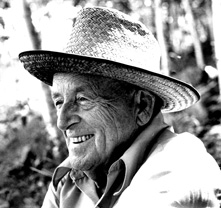Albert Tessier (1895-1976)
An Active Priest
Albert Tessier was the son of a farmer who studied classics in Trois-Rivières, where he settled when he became a priest in 1920. Following theology studies in Rome and history studies in Paris, he began a career as a teacher. He published articles with a nationalist bent on regional and later Quebec history. He was also a publisher of historical studies and books on Quebec. He contributed to the popular radio program Radio-College. In 1937, he was hired as a “visitor” by the Écoles ménagères, whose mission was to “train single women in household science”. This enabled him to travel throughout Quebec.
A Precursor of Cinéma Direct
Thirty years before cinéma direct, Tessier worked in the same vein in his “camera operator films”. During his educational training tours to the four corners of Quebec, he screened his films and commented on them to a variety of audiences, from boy scouts to farmers and from residents of convents to bishops.
For Tessier, documentary films were less a means of artistic expression than a way of revealing the world’s beauty and communicating its values. His goal was clearly propagandistic: he wanted to teach history, a love of the land and rural life, the beauty of virgin nature, nationalism, the discipline of work well done, the importance of education and the wisdom of the elderly. He especially wanted to “develop the faculty for wonderment” and to “awaken people to the beauty of the environment”.
In 1980, the government of Quebec created the Prix Albert-Tessier for lifetime achievement in the cinema.
- Themes
- 16 mm
- Native Peoples in the Cinema
- The Talkies Arrive
- Television
- French Canadians at the NFB
- Censorship
- Religious Cinema
- Settling the Land
- Film and French language
- Cinema and Religion
- 16mm Exhibition Circuits
- Quebec’s French Cousins in its Cinema
- Colour
- Film Distributors and Exhibitors
- Hollywood in Quebec
- Maria Chapdelaine
- Quebecers in Hollywood
- Radio and Cinema
- The Massey Report
- Film Magazines
- Second World War
- Organisations
- Biographies
- Juliette Béliveau
- Jean-Yves Bigras
- Léo Choquette
- Fifi D'Orsay
- René Delacroix
- J.A. DeSève
- George Ganetakos
- Pauline Garon
- Gratien Gélinas
- Nicole Germain
- John Grierson
- Paul Gury
- Richard Jarvis
- Paul L'Anglais
- Louis-Roger Lafleur
- Herménégilde Lavoie
- Ovila Légaré
- Guy Mauffette
- Joseph Morin
- Fedor Ozep
- Jean Palardy
- Vincent Paquette
- Jean-Marie Poitevin
- Maurice Proulx
- Roger Racine
- Norma Shearer
- Gordon Sparling
- Albert Tessier
To learn more
-
Albert Tessier, à force d’images. Dir. : Louis Ricard [Les Films Cénatos for Radio-Canada, 1975]
- Démonstration religieuses trifluviennes, 1933-1936. Dir. : Albert Tessier [1936]
- Écoles et écoliers. Dir. : Albert Tessier [1940]
- Femme forte. Dir. : Albert Tessier [1938]
- Hommage à notre paysannerie. Dir. : Albert Tessier [1938]
- Quatre artistes canadiens. Dir. : Albert Tessier [1939]
-
René Bouchard, Filmographie d’Albert Tessier (Montreal: Boréal Express, 1973).
-
René Bouchard, “Un précurseur du cinéma direct: Mgr Albert Tessier”, Cinéma Québec, 51 and 52 (1977 and 1978): 19-23 and 27-33.
